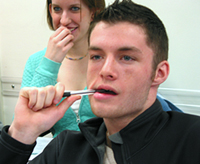 No one likes to admit it, but traditional history surveys are, most of the time, pretty boring. Not for teachers, perhaps. But if we focus on students (and not just the few we can count on to tell us what we want to hear), the history survey is, for most of them, a tedious affair.
No one likes to admit it, but traditional history surveys are, most of the time, pretty boring. Not for teachers, perhaps. But if we focus on students (and not just the few we can count on to tell us what we want to hear), the history survey is, for most of them, a tedious affair.
As someone who regularly makes this assertion before audiences of history teachers, it is striking how rarely anyone will ask for evidence to support my claim. It is as if everyone has already seen the evidence, seen so much evidence, in fact, that they do not need to see more to be persuaded that the survey could be a laboratory for the study of boredom. The evidence is there every day on the faces of our students. And if that can be ignored or denied, then consider this: When was the last time you heard a teacher of upper-level courses say, “My students are so well prepared! Our surveys are doing an extraordinary job of getting students ready for upper level courses!”
A classic representation of the low regard many people have for beginner’s level history courses is John Hughes’s 1986 movie Ferris Bueller’s Day Off. In a scene students continue to identify with, a class of bored, listless students endures with varying degrees of stupefaction and dismay a tedious history class in which the teacher vainly tries to draw out their knowledge of names, facts, and dates with a droning “Anyone? Anyone?” patter. It is a brilliant scene, said to be among the top fifty most recognized scenes in Hollywood film history. And so it goes from Hollywood to Harry Potter. From the first book in the Potter series: “Easily the most boring lesson was History of Magic, which was the only class taught by a ghost.” Wherever one looks in popular culture, if there’s a history class in the text, the history teacher rarely comes off well, and the students are usually presented as bored, disengaged, and inert.
Is there any more direct evidence to suggest that students find coverage surveys boring? Wanting to learn more about how Americans make connections to the past, David Thelen and Roy Rosenzweig directed 1,500 interviews in the early 1990s that used open-ended questions to probe Americans’ attitudes about history. When interviewees were asked to describe their experiences studying history in school, the words they used most often were “dull,” “boring” and “irrelevant.” (The Presence of the Past: Popular Uses of History in American Life, Columbia, 1998.) It is not the case, argued Thelen and Rosenzweig, that Americans are reluctant to engage the past—museum attendance, book sales, movie receipts, and even the nostalgia and entertainment-driven audience for ESPN Classic and the History Channel all demonstrate that Americans care a lot about the past. But clearly what they don’t care for is history class. School history, respondents indicated, drained the life out of subjects they might otherwise have found interesting.
But this has nothing to do with college level survey courses, some will say. It is a high school teacher being lampooned in Ferris Bueller, after all. And how many of those survey respondents took history courses in college? To be sure, secondary school surveys must shoulder a share of the blame for alienating large numbers of people from the academic study of the past. But who are the high school teachers imitating when they design their history courses? Who were their models for how to teach history? If college surveys are not responsible for creating the impression that school history is boring, is there any reason to believe they are successful in counteracting this widespread belief?